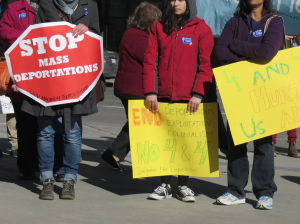Canada’s foreign workers jubilant over junking of four-year limit

Temporary foreign workers in Canada are happy that the 4-year stay limit has been removed, but more improvements are needed in the temporary worker program. CONTRIBUTED
RED DEER, Alberta – Migrant workers scored an initial victory following the announcement by the Canadian government repealing the burdensome 4-in, 4-out rule in the Temporary Foreign Worker Program (TFWP).
Beginning December 13, Immigration, Refugees and Citizenship Canada (IRCC) no longer take into account the four-year rule when processing work permit applications after the controversial rule that only allowed guest workers four years stay in Canada was removed.
“Workers who were previously affected by this rule will be able to apply for and obtain new work permits, as long as they meet the requirements to do so,” said IRCC spokesperson Nancy Chan in an email to INQUIRER.net on Wednesday.
“The Government has also committed to further developing pathways to permanent residency to provide greater opportunities to temporary workers looking to transition to permanent status, but more work needs to be done to determine how best to accomplish that,” she added.
Restoration
Foreign workers who have lost status as a result of the 4-in, 4-out rule could get a second chance, but they must meet certain eligibility requirements to have their status restored, one of which is having lost their status for less than 90 days.
Furthermore, the foreign worker should have no infractions to the Immigration and Refugee Protection Act (IRPA) when applying for a new work permit. Violations include unauthorized stay in Canada beyond their allowed period or working without permit.
“If they are not eligible to apply for restoration or more than 90 days has expired, they would need to leave Canada because the person is in violation of the IRPA and is inadmissible to Canada,” IRCC said in an email statement to INQUIRER.net
“An inadmissible person may be denied a visa or an Electronic Travel Authorization (eTA), refused entry to Canada, or removed from Canada,” the department further said.
Foreign workers who had failed to gain permanent status and had reached their cumulative four-year limit in Canada were ordered to leave the country beginning April 1, 2015.
The now defunct four-year rule had also forced a still undetermined number of foreign workers to remain in Canada without status thereby breaching the immigration act.
Regularization
Coalition for Migrant Worker Rights Canada (CMRWC) has proposed a regularization program for workers who have become undocumented in Canada.
CMRWC maintained while the removal of the four-year rule is an important step, the TFW program needs a system overhaul.
“We need a total overhaul of the system which begins with ensuring permanent status on landing for migrant workers now and a regularization program for workers who stayed and became undocumented,” the group said in a statement.
The group criticized the government’s move to improve pathways to permanent residence calling it a “euphemism” for maintaining the status quo on foreign workers.
“A pathway is a two-stage process, where migrant workers must first complete a temporary sentence of abuse and injustice before a few are selected to compete for permanent status,” the group added.
“Dozens of our members have been forced to become undocumented or leave Canada because of this badly planned, and badly executed law that seems to have been designed by the previous government simply to show that they were being hard on migrant workers,” said Anna Malla of the Caregivers’ Action Centre.
Comprehensive policy
Meanwhile, Human Resources and Skills Development Canada (HRSDC) has kept the cap on the TFW mix in the accommodations, food services and retail trade sectors at 10 percent for users of the program after June 2014 and at 20 percent for the ones who hired before the period.
Only regions with lower than six percent unemployment rate would be allowed to access the TFW program.
“This policy was put into place to limit the entry of foreign workers in areas of high unemployment (six percent or higher) on the basis that there should be available local labor for these positions which require minimal training,”
Amélie Maisonneuve, HRSDC spokesperson told INQUIRER.net.
The federal government would like to see these jobs offered to groups currently underrepresented in the Canadian labor force, such as youth, Indigenous peoples, new immigrants and persons with disabilities, said Maisonneuve. These groups have much higher unemployment rates compared with other sectors, she explained.
The initial policy changes did not yet include the removal of the $1,000 market test fee or the Labor Market Impact Assessment (LMIA), which users of the TFW program had said burdened employers and to some degree, workers who are obliged to repay their employers.
A comprehensive policy will be tabled when Canada’s House of Commons resumes sitting in the New Year.#







